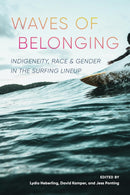Description
Edited by Lydia Heberling, an assistant professor of ethnic studies at California Polytechnic State University, San Luis Obispo, and David Kamper, a professor of American Indian studies at San Diego State University. Contributors include Nick Reo, an enrolled member of the Sault Ste. Marie Tribe of Chippewa Indians (Anishinaabe). He uses Indigenous methodologies to study and participate in Indigenous knowledge practices, Indigenous land and sea tenure, and Indigenous language revitalization, and Dina Gilio-Whitaker, a member of the Colville Confederated Tribes and an academic, journalist and author, who studies Native Americans in the United States, decolonization and environmental justice.
The surf zone, the place between ocean and shore, offers a powerful space to reflect on the dynamic contemporary politics of our worlds. Surfing always occurs on Indigenous lands, and centering Indigeneity in surfing studies both recognizes this fundamental fact and creates a different starting point for connecting surfing, storytelling, power, and relationships. In Waves of Belonging, Lydia Heberling, David Kamper, and Jess Ponting gather essays by scholars and practitioners that grapple with power, identity, and belonging while remaining grounded in a sense of hope and futurity.
Contributors explore how Black, Indigenous, Latinx, queer and trans, and female-identifying communities transform surfing culture into possibilities for new imagined relations. The essays also interrogate the implications of the COVID-19 pandemic and twenty-first century racial protest movements as they manifest in surfing communities, geographies, and cultures across the world. Throughout the volume, surfing emerges as a method for decolonizing, righting historical wrongs, and restoring relationship with lands and waters and as a praxis for language learning.
Original and timely, Waves of Belonging challenges the histories of exclusivity associated with surfing and demonstrates how Black, Indigenous, and LGBTQ+ people have drawn on surfing's counterculture reputation to construct new spaces of hope and community.


